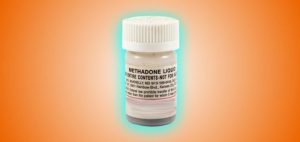What is Methadone?
 Methadone is a synthetic opioid that blocks the effects of heroin and other prescription drugs containing opiates. Used successfully to treat pain as well as opioid withdrawal for more than 40 years, methadone has been shown to eliminate withdrawal symptoms and relieve drug cravings from heroin and prescription opiate medications.
Methadone is a synthetic opioid that blocks the effects of heroin and other prescription drugs containing opiates. Used successfully to treat pain as well as opioid withdrawal for more than 40 years, methadone has been shown to eliminate withdrawal symptoms and relieve drug cravings from heroin and prescription opiate medications.
It works by interacting with opiate receptors in the brain. Federal law and regulations require that when methadone is used in maintenance or detoxification treatment of opioid dependence that it be dispensed by a licensed and accredited Opioid Treatment Program (“OTP”).
When used properly in maintenance treatment, methadone does not induce euphoria or sedation. An appropriate maintenance dose will eliminate cravings and symptoms of withdrawal. Methadone is longer acting than other opiates, such as heroin or oxycodone.
It generally takes effect in 30-60 minutes and works for 24-36 hours (as opposed to 4-6 hours for most other opiates), and thus needs to be taken only once a day. It is administered in oral form, which eliminates the risks associated with intravenous or intranasal opiate use, such as HIV/AIDS, hepatitis, and other health problems.
Common side effects of methadone include drowsiness, dizziness, confusion, nausea, vomiting, and constipation. It may also cause headaches, mood changes, dry mouth, changes in blood pressure, difficulty urinating, rash, sweating, flushing, vision problems, and sexual side effects. Report all side effects to us.
Serious side effects include seizures and cardiac and respiratory complications. If you experience any of these, seek emergency medical help immediately because it can be fatal. To avoid  complications, tell us all drugs (prescription, illicit, or over-the-counter), vitamins, herbal products, and nutritional supplements you are taking or plan to take.
complications, tell us all drugs (prescription, illicit, or over-the-counter), vitamins, herbal products, and nutritional supplements you are taking or plan to take.
Also, tell us if you have or have ever had a head injury, brain tumor, stroke or any other condition that caused high pressure inside your skull, irregular heartbeat, asthma, lung disease, or breathing problems, urethral stricture, enlarged prostate, or any other condition that causes difficulty urinating, Addison’s disease, or thyroid, heart, liver, or kidney disease. Tell us if you are pregnant, plan to become pregnant, or are breast-feeding. If you become pregnant while taking methadone, tell us immediately.
If you are having surgery, including dental surgery, tell the doctor or dentist that you are taking methadone, as it can have potentially life-threatening interactions with anesthesia.
Methadone is NOT a treatment for cocaine abuse, alcoholism, or any other drug problem. If you find that you are struggling with these additional issues, please see us for an appropriate referral to help you address them. Stabilization on methadone, coupled with any necessary additional treatment, can help you reduce or eliminate your overall drug use.



